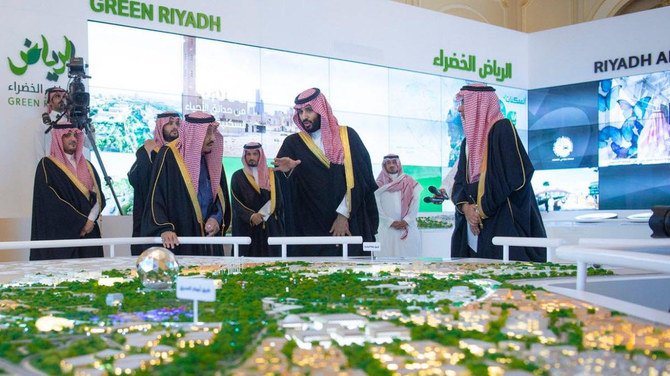
- ARAB NEWS
- 02 Jul 2025

The first Future Investment Initiative forum five years ago witnessed the birth of NEOM, when Crown Prince Mohammed bin Salman shared his vision of that giga-project with the rest of the world.
This year we are awaiting another “big bang,” when the crown prince will reveal an energy transition roadmap for the Kingdom during the Saudi Green Initiative Forum due to take place between Oct. 23 and 25.
Saudi Energy Minister Prince Abdulaziz bin Salman revealed on Thursday during Russian Energy Week that the crown prince would startle the world with new figures on Saudi emissions at the upcoming event.
So now at least we know that the forum isn’t just another “greenwashing” event. Rather, it will be a turning point for the Kingdom’s energy policy.
For years, Saudi Arabia has been trying to break away from its dependency on oil. But every time the Kingdom moves ahead with these plans, they get derailed by high oil prices. High oil prices have a psychological impact on how policymakers plan for the future. If they are up for a considerable period, all non-oil economy plans get shelved and business becomes as usual.
This time, things are different and the Saudis are more determined to make a change.
I’m sure that many critics in developed or Western economies will view any announcement as a greenwashing attempt, knowing that Saudi Arabia is the largest oil exporter on the planet and it may become larger with new plans to cut the use of petroleum liquids in electricity at home fully and use gas and renewables instead to fuel its power stations.
The energy minister also said that shale gas (coming from the massive Jafurah Basin) would accelerate the transition to clean energy in the Kingdom as emissions would fall, with gas displacing oil.
This is good news for energy companies in the country that will stay busy building and commissioning solar power plants. But two questions arise here. First, what is the timeline for such developments? And, second, why is Saudi Arabia suddenly doing this?
Saudi Arabia is still in need of a mission to revamp the education system and culture to create a class of entrepreneurs who can save the economy
Wael Mahdi
As for the timeline, my guess is that everything will be squeezed to happen by 2030, a very tight deadline but not an impossible one to achieve.
Why is Saudi Arabia committing itself to all of this now? Well, first let’s agree that the Saudis were never serious about solar before 2017.
The Kingdom announced many big plans, such as the King Abdullah City of Atomic and Renewable Energy. However, these plans were just on paper for many reasons. People at the time didn’t believe in renewable energy and, second, there was not enough accountability in the system for all of these agencies.
I’ve not met an energy expert who believed in the City’s plans behind closed doors, but they were all praising it in the open. Why? Because they were never realistic. It’s not that it didn’t have the caliber or the resources; it had those, but it had neither the mandate nor the support of other ministries. That’s history now.
In the new Saudi Arabia, ministers can’t put obstacles in the way of each other because accountability is very high and there are metrics and national alignment on things. There is enough centralization to push plans forward.
Considering other factors, Saudi Arabia is in a race to monetize its oil wealth before oil demand peaks and that means it needs to produce every single molecule it can and sell it at the best possible price to finance other plans to transform the economy into a non-oil economy. Therefore, consuming oil at home at cheap prices won’t help, and delaying selling that oil won’t help either as consuming countries are trying to move away into other energy sources.
Another reason is that the Kingdom needs to become an active member of the G20 and it has to lead other nations in the region by example. It has international commitments it must honor when it comes to saving the planet.
Yet the Saudi economy will not break away from oil overnight and I don’t think that the mindset is there for that. It’s an addiction and a lifestyle. For Saudi Arabia to flourish, it needs to sell something to the rest of the world. It’s trying to do that with hydrogen now, and hopefully selling electricity to neighboring countries now that the Saudi and Egyptian grids are going to be connected.
The only thing worrying me is that not all people realize that we don’t have a lot of non-oil exports and we still rely on petrochemicals. Saudi Arabia is still in need of a mission to revamp the education system and culture to create a class of entrepreneurs who can save the economy, and we need to think about knowledge-based industries and services, mainly financial services, to create more income.
For now, let’s wait for Oct. 23 and imagine what kind of Green Saudi will emerge from the Saudi Green Initiative forum.
• Wael Mahdi is senior business editor at Arab News and co-author of “OPEC in a Shale Oil World: Where to Next?”
Twitter: @waelmahdi